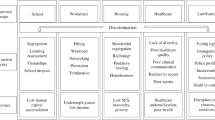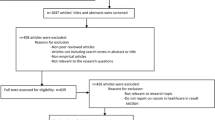ABSTRACT
BACKGROUND
Little is known about how U.S. physicians’ political affiliations, specialties, or sense of social responsibility relate to their reactions to health care reform legislation.
OBJECTIVE
To assess U.S. physicians’ impressions about the direction of U.S. health care under the Affordable Care Act (ACA), whether that legislation will make reimbursement more or less fair, and examine how those judgments relate to political affiliation and perceived social responsibility.
DESIGN
A cross-sectional, mailed, self-reported survey.
PARTICIPANTS
Simple random sample of 3,897 U.S. physicians.
MAIN MEASURES
Views on the ACA in general, reimbursement under the ACA in particular, and perceived social responsibility.
KEY RESULTS
Among 2,556 physicians who responded (RR2: 65 %), approximately two out of five (41 %) believed that the ACA will turn U.S. health care in the right direction and make physician reimbursement less fair (44 %). Seventy-two percent of physicians endorsed a general professional obligation to address societal health policy issues, 65 % agreed that every physician is professionally obligated to care for the uninsured or underinsured, and half (55 %) were willing to accept limits on coverage for expensive drugs and procedures for the sake of expanding access to basic health care. In multivariable analyses, liberals and independents were both substantially more likely to endorse the ACA (OR 33.0 [95 % CI, 23.6–46.2]; OR 5.0 [95 % CI, 3.7–6.8], respectively), as were physicians reporting a salary (OR 1.7 [95 % CI, 1.2–2.5]) or salary plus bonus (OR 1.4 [95 % CI, 1.1–1.9) compensation type. In the same multivariate models, those who agreed that addressing societal health policy issues are within the scope of their professional obligations (OR 1.5 [95 % CI, 1.0–2.0]), who believe physicians are professionally obligated to care for the uninsured / under-insured (OR 1.7 [95 % CI, 1.3–2.4]), and who agreed with limiting coverage for expensive drugs and procedures to expand insurance coverage (OR 2.3 [95 % CI, 1.8–3.0]), were all significantly more likely to endorse the ACA. Surgeons and procedural specialists were less likely to endorse it (OR 0.5 [95 % CI, 0.4–0.7], OR 0.6 [95 % CI, 0.5–0.9], respectively).
CONCLUSIONS
Significant subsets of U.S. physicians express concerns about the direction of U.S. health care under recent health care reform legislation. Those opinions appear intertwined with political affiliation, type of medical specialty, as well as perceived social responsibility.
Similar content being viewed by others
REFERENCES
McDonough JE. The road ahead for the Affordable Care Act. N Engl J Med. 2012;367(3):199–201.
Zeleny JGOP. Vowing to take battle over health care law into November. New York Times. June 29, 2012.
Pew Research Center. Obama holds lead; Romney trails on most issues. 2012; http://www.people-press.org/2012/07/12/obama-holds-lead-romney-trails-on-most-issues/. Accessed May 24, 2013.
Antiel RM, Curlin FA, James KM, Tilburt JC. Physicians’ beliefs and U.S. health care reform—a national survey. N Engl J Med. 2009;361(14):e23.
Gruen RL, Campbell EG, Blumenthal D. Public roles of US physicians: community participation, political involvement, and collective advocacy. JAMA. 2006;296(20):2467–2475.
Thomson-Reuters. The 2011 National Physicians Survey: Frustration and Dismay in a Time of Change. 2011; http://mikemeikle.files.wordpress.com/2011/01/2011-thomson-reuters-hcplexus-national-physicians-survey.pdf. Accessed May 24, 2013.
The American Association for Public Opinion Research. Standard definitions: final dispositions of case codes and outcome rates for surveys. 7th ed: AAPOR; 2011.
Winkelman TN, Antiel RM, Davey CS, Tilburt JC, Song JY. Medical students and the Affordable Care Act: uninformed and undecided. Arch Intern Med. 2012;172(20):1603–1605.
Huntoon KM, McCluney CJ, Scannell CA, et al. Healthcare reform and the next generation: United States medical student attitudes toward the Patient Protection and Affordable Care Act. PLoS One. 2011;6(9):e23557.
Acknowledgements
This research was funded by a grant from the Greenwall Foundation, the Mayo Clinic Program in Professionalism and Ethics, and an Early Career Development Award from the Mayo Clinic Foundation. None of the funders had a role in the design and conduct of the study; collection, management, analysis and interpretation of the data; and preparation, review or approval of the manuscript.
Conflict of Interest
The authors declare that they do not have any conflicts of interest.
Author information
Authors and Affiliations
Corresponding author
Electronic Supplementary Material
Below is the link to the electronic supplementary material.
Online Appendix A
(XLSX 15 kb)
Rights and permissions
About this article
Cite this article
Antiel, R.M., James, K.M., Egginton, J.S. et al. Specialty, Political Affiliation, and Perceived Social Responsibility Are Associated with U.S. Physician Reactions to Health Care Reform Legislation. J GEN INTERN MED 29, 399–403 (2014). https://doi.org/10.1007/s11606-013-2523-0
Received:
Revised:
Accepted:
Published:
Issue Date:
DOI: https://doi.org/10.1007/s11606-013-2523-0




